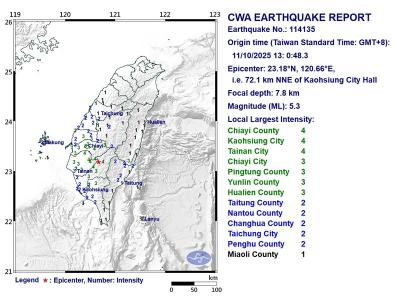When Li Hsi-mei was studying Russian at university in the 1970s, it all seemed rather pointless, as fiercely anti-communist Taiwan had no ties with the Soviet Union.
Today, however, Russian language courses are popular, with many students eager to take advantage of the opportunities that have arisen as a result of close Russian-Taiwanese trade and cultural links.
“When I was studying Russian at National Chengchi University, our university took in 15 students for Russian language each year. But today it accepts 60 students each year,” Li said.
“The demand for graduates who can speak Russian is high. Today I received letters from three companies asking for our graduates because they want to do business with Russia,” she said.
When the Chinese Nationalist Party (KMT) government ruled China, dictator Chiang Kai-shek (蔣介石) briefly dealt with the Russians and even allowed his son Chiang Ching-kuo (蔣經國) to study communism in the Soviet Union.
But when the Communists toppled Chiang Kai-shek in 1949, they did so with the help of Soviet Communists, forcing Chiang’s government into exile in Taiwan.
Chiang died in 1975 and was succeeded by his son three years later. That move created one high-level tie to Russia: Chiang Ching-kuo’s wife and first lady, Faina Epatcheva Vahaleva (蔣方良), was Russian.
But it was hardly representative of ties between Taiwan and Russia. Indeed, they were nearly non-existent.
Three Taiwanese universities and a military academy were required to teach Russian in preparation for the fall of Communism and future ties with Russia.
“During these years, students were assigned to study Russian because no one wanted to learn it, since they could not find Russian-related work after graduation. Even the Ministry of Foreign Affairs [MOFA] did not need many Russian-speaking graduates,” Li said.
The opportunity finally came in 1991 when the Soviet Union dissolved, making way for 15 independent states. Currently about 200 students from Taiwan are enrolled at universities in Russia and an equal number of Russian students at institutions in Taiwan.
MOFA has increased its Russia-speaking staff to about 30 members.
In January 1992, then deputy foreign minister John Chang (蔣孝嚴) undertook an “ice-breaking” visit to Moscow, followed by a donation to Russia of 100,000 tonnes of rice and a visit by Russian lawmakers.
The following year, Taiwan opened a representative office in Moscow. Subsequently, Russia opened a representative office in Taipei in 1996, to handle unofficial ties and to issue visas.
Although Russia and Taiwan have no formal ties, the two sides have signed pacts on trade, scientific research, student exchange and shipping and aviation.
Bilateral trade soared from US$120 million to US$4 billion between the early 1990s and last year, with more than 20 Taiwan-based companies having opened factories in Russia so far, official figures show.
Taiwanese tourists who venture beyond the former Iron Curtain say they are generally shocked by the vastness of Russia, its rich culture, economic power and breathtaking scenery. Last year around 15,000 Taiwanese visited Russia.
Russia’s diplomatic circle has long been interested in Taiwan, even before the collapse of the Soviet Union, according to Russia’s representative to Taiwan, Sergey Gubarev.
Russia’s stance is that Taiwan-China issues should be solved peacefully and, “as long as cross-strait ties improve, Russia-Taiwan ties will improve,” he said.
Eumeia Language Center in Taipei is one of several Russian language schools doing brisk business these days.
“Our students come from all walks of life and vary in age. Their motivation for learning Russian is also different — some want to do business with Russia, some want to go to Russia to study arts and music, and some are simply interested in Russia,” a representative of the school said.

The Central Weather Administration (CWA) today issued a sea warning for Typhoon Fung-wong effective from 5:30pm, while local governments canceled school and work for tomorrow. A land warning is expected to be issued tomorrow morning before it is expected to make landfall on Wednesday, the agency said. Taoyuan, and well as Yilan, Hualien and Penghu counties canceled work and school for tomorrow, as well as mountainous district of Taipei and New Taipei City. For updated information on closures, please visit the Directorate-General of Personnel Administration Web site. As of 5pm today, Fung-wong was about 490km south-southwest of Oluanpi (鵝鑾鼻), Taiwan's southernmost point.

Almost a quarter of volunteer soldiers who signed up from 2021 to last year have sought early discharge, the Legislative Yuan’s Budget Center said in a report. The report said that 12,884 of 52,674 people who volunteered in the period had sought an early exit from the military, returning NT$895.96 million (US$28.86 million) to the government. In 2021, there was a 105.34 percent rise in the volunteer recruitment rate, but the number has steadily declined since then, missing recruitment targets, the Chinese-language United Daily News said, citing the report. In 2021, only 521 volunteers dropped out of the military, the report said, citing

A magnitude 5.3 earthquake struck Kaohsiung at 1pm today, the Central Weather Administration said. The epicenter was in Jiasian District (甲仙), 72.1km north-northeast of Kaohsiung City Hall, at a depth of 7.8km, agency data showed. There were no immediate reports of damage. The earthquake's intensity, which gauges the actual effects of a temblor, was highest in Kaohsiung and Tainan, where it measured a 4 on Taiwan's seven-tier intensity scale. It also measured a 3 in parts of Chiayi City, as well as Pingtung, Yunlin and Hualien counties, data showed.

Nearly 5 million people have signed up to receive the government’s NT$10,000 (US$322) universal cash handout since registration opened on Wednesday last week, with deposits expected to begin tomorrow, the Ministry of Finance said yesterday. After a staggered sign-up last week — based on the final digit of the applicant’s national ID or Alien Resident Certificate number — online registration is open to all eligible Taiwanese nationals, foreign permanent residents and spouses of Taiwanese nationals. Banks are expected to start issuing deposits from 6pm today, the ministry said. Those who completed registration by yesterday are expected to receive their NT$10,000 tomorrow, National Treasury